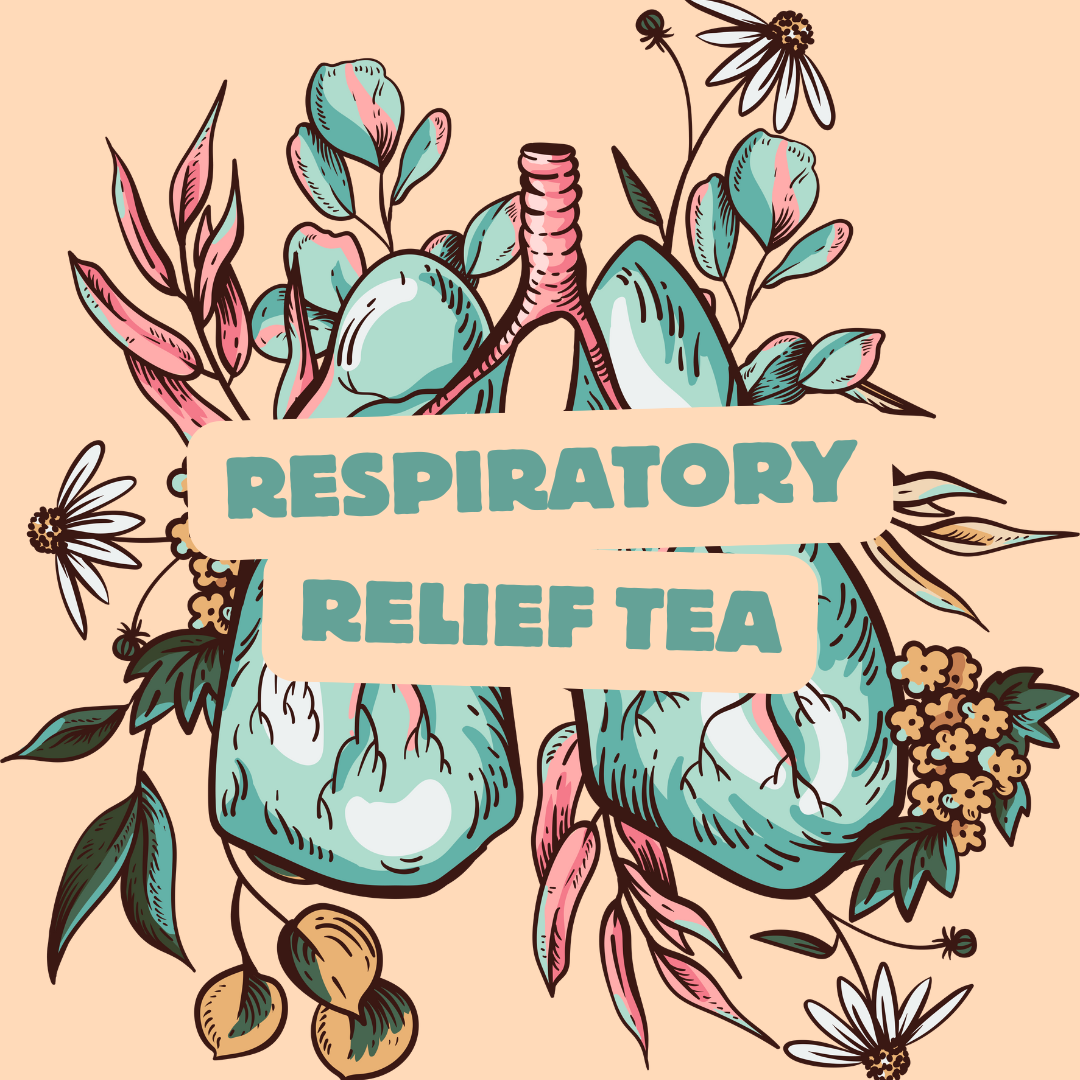
Respiratory Relief Tea
When respiratory challenges arise, whether it’s a dry cough, a lingering infection, or just general discomfort, finding natural support is key to getting back on track. Our Respiratory Relief Tea is carefully crafted to provide just that—a soothing and healing blend designed to support your respiratory system through every breath. With the powerful combination of licorice root, tulsi, elderflower, and mullein, this tea is your go-to remedy for respiratory infections, dry coughs, and any disruptions to your respiratory health.
In this post, we’ll explore each of these incredible herbs, highlighting their actions, energetics, and uses from an herbalist's perspective, and discover why they work so effectively together in this blend.
🌿 Licorice Root: The Soothing Protector
Actions:
- Demulcent, anti-inflammatory, expectorant, antiviral, adrenal tonic, alterative, antacid, anti-arthritic, antibacterial, anti-fungal, anti-mutagenic, antioxidant, antispasmodic, antiseptic, antitumor, antitussive, anti-venomous, antiviral, aperient, aphrodisiac, chi tonic, emollient, febrifuge, galactagogue, hepatoprotective, immune-tonic, laxative, lung tonic, nutritive, pectoral, phytoestrogenic, rejuvenate, sedative, sialogogue.
Energetics:
Licorice root is considered sweet, moistening, and neutral in temperature. Its moistening qualities make it particularly effective for soothing dry and irritated mucous membranes, while its neutral temperature allows it to be versatile in both cooling and warming formulations.
Uses:
Licorice root is often used to soothe sore throats, ease coughs, and support overall respiratory health. Its demulcent properties provide a protective coating to irritated tissues, making it particularly helpful for dry coughs and inflammation. Additionally, licorice root is valued for its adaptogenic qualities, helping to support adrenal function and overall vitality during times of stress and illness.
🌿 Tulsi: The Holy Healer
Actions:
- Adaptogen, immunomodulator, anti-inflammatory, expectorant, antimicrobial, antidepressant, antioxidant, antiseptic, antispasmodic, circulatory stimulant, diaphoretic, febrifuge, nervine, sedative
Energetics:
Tulsi, more commonly known as holy basil, is warming and slightly drying. Its warming nature helps to stimulate circulation and clear stagnation, making it ideal for supporting respiratory function and immune response. The drying effect is beneficial in clearing excess mucus and congestion.
Uses:
Tulsi is revered for its ability to enhance overall respiratory health and immune function. It is particularly effective in addressing respiratory infections and inflammation, helping to clear mucus and ease breathing. Tulsi’s adaptogenic properties also help the body manage stress, making it a valuable herb during illness or recovery.
🌿 Elderflower: The Gentle Defender
Actions:
- Diaphoretic, antiviral, anti-inflammatory, expectorant, antioxidant, astringent, diuretic, febrifuge, immune boosting.
Energetics:
Elderflower is known for its cooling and drying energetics. Its cooling properties help to reduce fever and inflammation, while the drying aspect aids in managing excess mucus and congestion.
Uses:
Elderflower is often used by herbalists to support the body during colds, flu, and other respiratory infections. Its diaphoretic action helps to induce sweating and reduce fever, while its antiviral properties support the immune system. Elderflower is gentle yet effective, making it a perfect choice for easing respiratory discomfort and promoting overall wellness.
🌿 Mullein: The Respiratory Restorer
Actions:
- Demulcent, expectorant, anti-inflammatory, astringent, antispasmodic, chilblains, mucilage, diuretic, catarrh
Energetics:
Mullein is considered cool and moistening, with a slight drying effect. Its coolness soothes irritated tissues, while its moistening qualities help to hydrate and heal dry, inflamed mucous membranes.
Uses:
Mullein is a go-to herb for supporting respiratory health, particularly in cases of dry coughs and bronchial irritation. Herbalists value mullein for its ability to soothe the respiratory tract, ease coughing, and promote the expulsion of mucus. It’s a gentle yet powerful herb that restores comfort and ease to the respiratory system.
Why Licorice Root, Tulsi, Elderflower, and Mullein Work So Well Together
The combination of licorice root, tulsi, elderflower, and mullein in Respiratory Relief Tea creates a balanced and effective blend designed to address multiple aspects of respiratory health. Licorice root and mullein provide soothing, demulcent actions that help to protect and heal irritated tissues, while tulsi and elderflower offer immune support and help to clear congestion.
Together, these herbs offer a comprehensive approach to respiratory relief, whether you’re dealing with a dry cough, a lingering infection, or any other respiratory disruption. Their combined energetics—balancing warmth and coolness, moisture and dryness—ensure that this blend can be both soothing and stimulating, helping your body to heal naturally while providing comfort and relief.
Next time you’re feeling the effects of respiratory challenges, reach for a cup of Respiratory Relief Tea. Let the power of these healing herbs help you breathe easy and restore your well-being.
